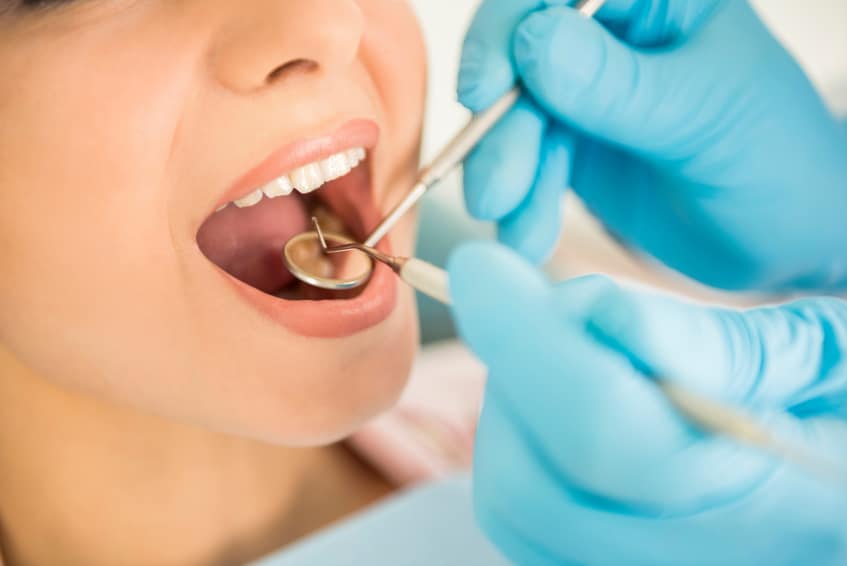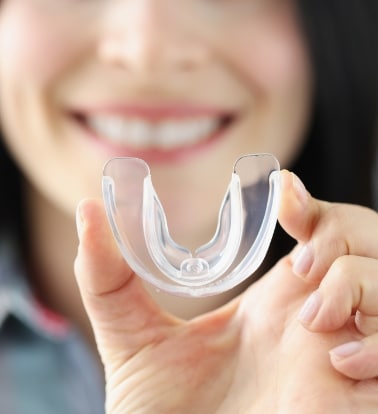Approximately half of all the adults in America suffer from gum disease, which is why Deer Park Dental offers periodontal treatments in Stockton to help patients improve their overall dental health and keep their beautiful smiles.
What is periodontics and what is gum disease?
Periodontics is a dental specialty that focuses on treating problems involving the gums, specifically a condition known as periodontal disease or gum disease. A gum disease is a serious condition in which the gums are infected and inflamed. This can be caused by bacteria that accumulate in the gum line and below the gums and irritates the tissues. When left untreated, bacteria are able to gradually recede or “lift” away the gums from the teeth by causing inflammation near the bone that supports the teeth causing them to resorb and recede away from the teeth. This bone and tissue recession that may occur over time, losing the support that is essential for teeth to become stable, can, in worse cases, result in tooth loss. This loss of bone and attachment is called periodontal disease, gum disease or an old word pyorrhea.
What would happen if gum disease goes untreated?
Gum disease is just that, it is a disease that is managed not cured. If not treated, over time, one will lose bone support around the teeth, which is like losing the ground around a fence post, and the tooth will become loose and eventually have to be extracted or removed.
Can gum disease contribute to health problems beyond the mouth?
Gum disease does not cause medical problems but can be a contributing factor in increasing risk factors for disease. The healthier your gums and body are, may reflect in a decreased risk of other diseases.
What are the risk factors of developing gum disease?
Some of the risk factors for gum disease are genetics, smoking, diet, home care and frequency and quality of your dental cleaning.

How will I know if I have gum disease?
The symptoms of gum disease include bleeding gums that could be red, discolored, or puffy, tooth sensitivity, chronic unpleasant breath, pain when eating, a change in the size of the teeth, gaps forming in between teeth, and loosening of teeth. You will not always “feel” gum disease occurring so it is important to not “wait until it hurts” because at that time, it may be too late to save some teeth. Regular dental check-ups and cleanings are important for periodontal health.
What can I do to prevent gum disease?
There are three factors affecting gum disease: Genetics, how well you clean and how well your dental provider cleans your teeth. Smoking is a large contributor to bone loss, gum disease and early loss of teeth. Plaque and bacteria build up around your teeth and gums and this must be removed by brushing, flossing and having your teeth cleaned regularly. Our diet is a large contributor to plaque buildup. The more processed a food is the faster it is broken down, causing increased plaque around the teeth. The body’s reaction to the plaque and bacteria is inflammation which results in eventual bone receding (bone loss) which often is followed by gum recession. The healthier your diet, non-smoking, good oral hygiene (home care) and having your teeth cleaned every 3,4 or 6 months is a huge contributor to healthier gums and less gum disease. The bite relationship can also have an affect on the bone loss by traumatic occlusion, heavier than normal forces on a particular tooth. This is one of the areas evaluated at your initial exam by your dentists at Deer Park Dental. The bite relationship is not a cause of gum disease but can have adverse affects on the bone supporting the teeth.
What should I do if I think I am suffering from gum disease?
If you think you have any of the symptoms associated with gum disease, it is important to contact Deer Park Dental right away to schedule an appointment with our Stockton periodontist. Here at Deer Park Dental, Dr. Moreno, Specialist in Periodontics, sees both children and adults for periodontal treatment. During your first dental visit, Dr. Moreno will utilize a digital x-ray system to obtain detailed images of your mouth, periodontal probings to check the level of the gum pockets, bone and tissue levels as well as evaluate bleeding on probing and amount of calculus or tarter to fully assess your overall oral health status. By the end of your visit, an effective treatment plan will be outlined to treat your condition and improve oral health.
How is gum disease treated?
Initially scaling and root planing (or deep scaling) is done with local anesthetic so that the calculus and infection can be removed with no discomfort to the patient. Oral hygiene instruction is given and it is important to be shown how to brush and floss your teeth. Also it is important to have the patient demonstrate that they can do it correctly. In areas that do not respond completely to scaling and root-planing, occasionally further treatment is needed. In these cases isolated gum surgery/ periodontal surgery may be recommended to create access to the areas of the teeth that have experienced bone loss. After treatment a re- evaluation is completed to evaluate healing, the patients genetic response and the patients home care. At this time a time interval for cleanings will be recommended. Often patients who are susceptible to gum disease require cleanings every 3-4 months instead of every 6 months. The better your home care is, the greater chance you can go longer between cleanings.
Is gum disease treatment painful?
Treatment for gum disease is done under local anesthetic so that the treatment can be painless. After treatment there can be some soreness for a few days or in cases of severe gum disease for a little bit longer. Left untreated, a patient is susceptible to gum abscesses, swelling, infection and tooth loss. The long term effects of untreated gum disease can be much more harsh than initial treatment.
Will I need more than one treatment?
Ideally, we at Deer Park Dental, recommend treatment in two visits. One side of the mouth is treated and allowed to heal and be comfortable before the other side is treated. This allows one to comfortably eat and chew on the other side of the mouth and cause minimal disruption in your eating and schedule.
Are there any medications I need to take in addition to being treated in the office?
Only in cases of acute inflammation are antibiotics necessary. Taking antibiotics is a “band-aid” to the actual problem. The ideal treatment is to remove the infection and have good home care and stay on a regular cleaning interval. Some patients have medical conditions that require pre-medication with antibiotics prior to your dental visit. This should be discussed with your dentist.
When is surgery used to treat gum disease?
When some areas of gum disease are very severe and do not respond completely to the scaling and root-planing, then surgery may be necessary. It is critical that your home care is excellent when periodontal surgery in competed. Without good home care, a patient is at higher risk of root caries/ decay as well as the tissue getting puffy and inflamed and the infection returning more quickly. Tissue response is drastically different the better your home care is after treatment. With proper root-planing with local anaesthetic and excellent home care, often surgery is not needed. If the gum has receded due to the bone loss to a point that the firm attached gingiva (gums) is minimal, then it may be recommended to have a gum graft or connective tissue graft to strengthen the tissue around the tooth. At times, the gum graft can help to increase root coverage for esthetics and greater comfort of the tooth and gum tissue.
Schedule a Consultation
If you are interested in learning more about Periodontics and Gum Disease treatments please contact our office in Stockton, CA or call 209-478-3036 to schedule a consultation today!












